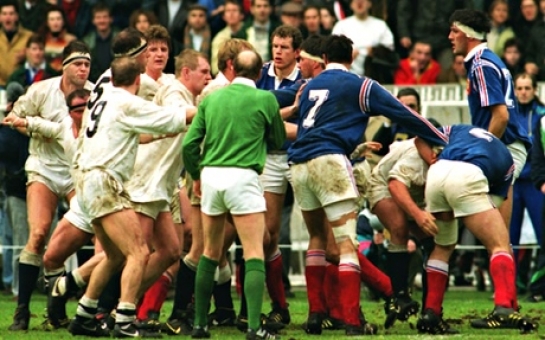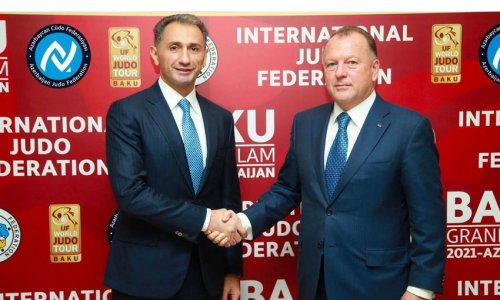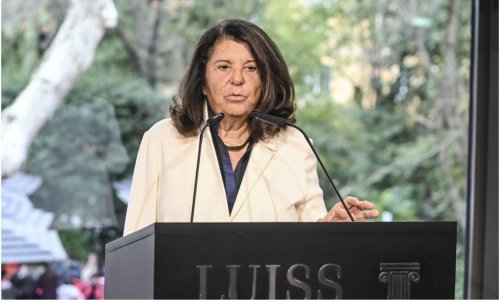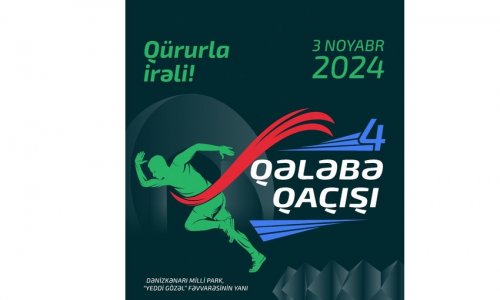It had been coming. In a way, this was a war a decade in the making. France had dominated the Five Nations in the 1980s, winning at least a share of the title in 1981, 1983, 1986, 1987, 1988 and 1989. England, on the other hand, began the 90s having won only two outright titles since 1958, the most recent of which had come under Bill Beaumont in 1980.The pattern seemed to have changed in 1990. England, having ended a seven-year losing streak against Les Bleus a year earlier, hammered France 26-7 in Paris and in their final game travelled to Murrayfield with the Triple Crown, Grand Slam and Five Nations title at stake. Scotland ran out 13-7 winners, but that win in the French capital was to prove pivotal. It was a few years before Steve Waugh would coin the term mental disintegration, but Will Carling's pack, most notably in the considerable shapes of Moore, Jeff Probyn, Mickey Skinner and Wade Dooley had begun trialling their own version."At the scrum, up went the front-rows," Skinner told the Times in 2011. "Moore was spitting at them, the French front row lost it. Mooro and Probs got into them. We had a pack who wanted to scrummage. Probs was doing his one-man demolition job. He would take punches at every scrum, took it left, right and centre, took it for the team … and not once did he flinch. We drew strength from that. Because he didn't react, they went mad. It was incredible, having that confidence in playing that way against a side and knowing we would win."A year later, the tournament came down to another winner-takes-all affair, this time with France as England's opponents at Twickenham. Despite three French tries, two of them majestic and one, Philippe Saint-André's, up there with the greatest seen in the sport (and the spur for a majestic piece of writing in these pages by the great Frank Keating), England ground to a 21-19 win, their forwards to the fore. While France failed to press home the advantage of set pieces in their opponents' 22, England forced penalty after penalty through ruck and maul. "England 's relief at the final whistle," wrote Robert Armstrong in the Guardian, "was like the dead weight of a decade suddenly lifting."In October, England returned to the Parc des Princes for that World Cup quarter-final. The bad blood had not dissipated. Moore, said Skinner, was "going berserk" in the tunnel before the game in an attempt to whip his fellow forwards into a battle frenzy. Early on, the England wing Nigel Heslop hammered into Serge Blanco, who had taken a mark. Cue a savage uppercut from the France full-back, aided and abetted by Éric Champ.Carling soon followed Heslop's lead, but escaped similar retribution. Up and unders were plopped into Blanco's hands, and the pack crashed over him like a studded white wave. It was ugly stuff. And with France riled into indiscipline, England, who would go on to lose to Australia in the final, again ground their way to victory."That defeat was the biggest disappointment of my career," said Blanco. "Not because of losing but because of the way it happened. The ref that day turned a blind eye to English foul play. He was incoherent. I was trampled, kicked and had my head walked on. So I punched the winger. No, I did not lose my cool. On the contrary, I was perfectly aware of what I was doing. There are times when the referee refuses to be honest and you have to take justice into your own hands."The result, said Jean Trillo, the French backs coach, heralded "the death of romanticism" in the game. In the tunnel after the game, the France coach Daniel Dubroca grabbed the referee, David Bishop, by the lapels and put him up against a wall. "I simply went up to congratulate him and said 'Bravo'," Dubroca said. Unsurprisingly no one believed him. The sack awaited.England began the defence of their Five Nations title with comfortable wins over Scotland and Ireland. France scraped to a 12-9 win in Cardiff, so when England visited Paris on 15 February it was essentially another title decider.And four months had done little to quell the fires, though both sides tried to play down fears of a bloodbath before the game. "I don't think it will be a war," Carling said. "If you want to win you just cannot afford to let your discipline slip."Dubroca had been replaced by Pierre Berbizier, who also announced himself confident of a match without violent intent but then picked in his pack two members of the notorious Bègles front row – Vincent Moscato, who had also carved a career as a successful boxer, and Philippe Gimbert."At Bègles we love the physical challenge, the battle up front," said Moscato before the tournament. "It is a great pleasure to physically subdue your opponent. We have been accused of violence. It is not violence. It is hardness. In the past, people have been fighting for survival for food. Nowadays in our society we channel our aggression into sport. That doesn't mean mindless violence. It means controlled aggression."The good intentions might have been genuine enough, but England were on the wind-up well before the teams took the field. Moore used a pre-match interview to describe Parc des Princes as a venue where violence was inevitable. It would be, said Moore, "a boxing match". Philippe Sella, the France captain, pinned his comments up on the dressing room wall in the France training camp."Berbizier took a risk," wrote the Observer's Eddie Butler in the aftermath a week later, "but if he was guilty of naively supposing he could change Moscato's habits of a lifetime, he wasn't helped by the journalistic interventions of England's Brian Moore. Lawyers and shop stewards know a thing or two about halting processes of reform and, by predicting violence, Moore brilliantly tilted the delicate balance in the French camp away from Berbizier. The moment Sella pinned the Moore article to the changing room door, Moscato was beyond restraint."Yet he and France largely managed to restrain themselves in the face of English provocation for the first hour. Sébastien Viars scored an early try to give the home side a 4-3 lead, but by half-time England led 15-4 (helped in no small part by a penalty try awarded when the France pack crumbled at a scrum). After the break they stretched their lead and by the hour mark, tempers were beyond frayed. An Olivier Roumat punch briefly knocked Dooley unconscious. On coming round, the lock turned to the referee, Stephen Hilditch, and summed up the wild west vigilante nature of the match: "Ref … do not send that fucker off."Then, with the England forwards' mental disintegration policy in full swing, it all got a little feisty. Grégoire Lascubé stamped on Martin Bayfield – "He did a Fred Astaire on my head," said the England man. He was sent off. The atmosphere at Parc des Princes started to bubble over. Moscato nutted Probyn before a scrum. Hilditch spotted it and gave the prop a dressing down. Probyn responded with a wink and a smile but he might as well have waved a red rag. Moscato, incandescent, tears of rage pouring from his eyes ("He'd lost his marbles," Dooley said later), dived in head first again and was dismissed. The home crowd howled its fury. Never before had two players been sent off in a Five Nations match.The final 15 minutes descended into a flurry of knee-drops that would have made a WWF wrestler proud, hence Moore's determination to duck-and-cover. Jean-François Tordo and a gouging Gimbert should probably also have seen red before full-time after throwing a couple more punches. Hilditch kept 13 men in France shirts on the pitch but still required a police escort when leaving the field. England won 31-13 and went on to record another championship victory, their second on the bounce at the start of a run of four titles in six years."The supreme accolade must go to our front five in terms of restraint," said the RFU president, Peter Yarranton, getting out his Mr Sheen and polishing the eight halos glimmering above the England pack. "But Brian Moore's face was covered in scratches, bruises and weals that bear no relation to rugby as I know it. Jeff Probyn summed it up when he said to me, misquoting Kipling: 'If you can keep your cool when others are losing theirs, you will win internationals.'"France, though, were rather less convinced of England's innocence. "It adds nothing to their glory, in fact it rather detracts from it," Berbizier said 12 months later of the provocation his players had faced. "I can already picture the spitting and swearing the English have resorted to over the past few years. Surely they don't need that to prove they're better than the rest. They should be sufficiently confident by now not to have to abase themselves and the game of rugby like that."Lascubé and Moscato were given 28-week bans but neither they nor Gimbert played for France again. Moscato returned to his boxing and then moved on to a successful acting career. But, in a sense, he has never truly recovered. "They broke my career," he said. "I will never forgive them."(theguardian.com)ANN.Az
The Forgotten Story of … France v England, 1992
Sport
14:30 | 31.01.2014

The Forgotten Story of … France v England, 1992
"The only time in an international game when my main concern was to ensure that I did not get myself into a position where I was defenceless," was Brian Moore's description of the final 15 minutes of England's Five Nations battle with France at the Parc des Princes in 1992. The Paris World Cup quarter-final of 1991 is often cited as the moment when Anglo-French relations reached their nadir, but in truth the contest four months later would be the one where the viciousness of the rivalry reached a brink from which it had to be pulled back. If 1991 was a closing time bar-room brawl, 1992 was the 1am dust-up in the car park.
Follow us !










